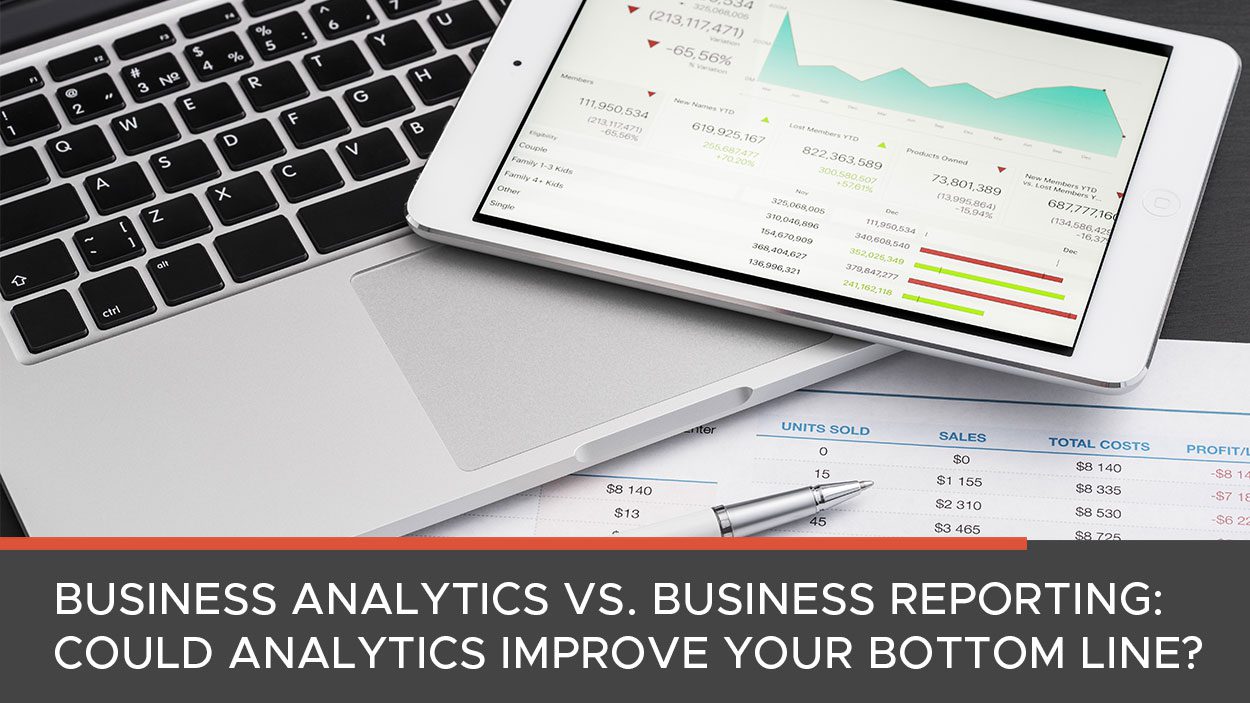Although modern companies have countless options for improving their bottom line, one of the most promising is the data they are collecting. However, the full potential of that data is only available to those companies that understand how to leverage business analytics.
How Are Business Analytics and Business Reporting Different?
Confusing business analytics with business reporting is a common mistake, but it can also be an extremely costly one. The differences between the two aren’t just a matter of semantics and understanding them is the only way to make the most of what analytics has to offer.
Business reporting refers to taking essential data and converting it into a format that is easily shareable and understood. By doing so, even the most complex business matters can not only be better understood but, ideally, improved.
For example, if a retail chain has invested in new audio systems, they would most likely appreciate business reporting that later shows them if this investment increased everything from foot traffic to dwell time to sales. This kind of reporting would harvest all of this information and display it in a way that was easy to review and utilize.
Business analytics refers to analyzing data to understand better what it is describing and, most importantly, gleaning actionable insights. So, in the example above, business analytics might involve assessing if increased foot traffic and dwell time led to increased sales or if the new audio accomplished that effect on its own. Answering this question would tell the retail chain’s executives what changes they should make to continue the improved sales numbers.
3 Business Analytics Benefits No Company Should Be Without
Business analytics has become more critical than ever before, primarily because it has become more available than ever. Thanks to modern technology, many small businesses can analyze data as well as their much larger competitors. When this kind of advantage is accessible to so many companies, any that refuse to leverage it find their futures in peril.
For example, a decade ago, utilizing business analytics to mine Big Data was only possible for companies that could afford the required hardware and cloud-based systems. As big data analytics became more affordable companies of just about any size were able to join in.
Those that haven’t done so yet are missing out on the following three business analytics benefits:
1. Anticipating Customers’ Needs
One of the best business analytics benefits is how it allows companies to meet the needs of their customers better, often anticipating new preferences before clients are even able to describe them. That’s why this approach is usually referred to as predictive analytics.
Retail companies regularly rely on predictive analytics to identify when they should discount certain items, declare storewide sales, and make other critical decisions. Netflix has become famous for its use of predictive analytics to recommend shows and movies to each user, a capability that has given the website a considerable edge over traditional Hollywood production studios.
2. Applying Personalization to the Buyer Journey
Through personalization, companies can modify their marketing campaigns in real-time based on a lead’s decisions but also on historical data regarding their preferences. This has become one of the most critical tactics in online marketing. It’s also only possible for organizations that have invested in business analytics.
For instance, Nuxeo is one of many companies benefiting from personalization, even though they target B2B companies that have longer buyer cycles. By maintaining a log of their leads’ visits, they have been able to recommend blog posts to each prospect and even run an algorithm that gathers additional information depending on which ones the lead decides to click.
3. More Effective Lead Scoring
Similarly, many companies don’t understand what makes the best customers. This is true among B2B and B2C companies.
The data may seem to point to a specific buyer type because they tend to initially spend the most substantial amounts or are the easiest to convert. By conducting in-depth analysis, though, companies often learn that another buyer type results in higher lifetime value. They may represent fewer headaches for the business, too.
This is why lead scoring is so important. Businesses do better when they understand how much a particular lead will be worth to them and, thus, how much it’s worth to spend on converting them. Business analytics can give them these kinds of insights.
Leveraging the Potential of Business Analytics
In the age of Big Data, some companies will experience much more significant growth than others. However, it won’t be because they have access to more information. It will because they use business analytics to leverage the maximum possible value from that information.
So, the future doesn’t belong to the companies that collect the most data. It belongs to the companies that know how to turn their data into a competitive edge.
Discover other trends revolutionizing the way business is done in our Technology Trends Guide.
Cory Porteous
Director of Marketing & Inbound Business Development
Office Interiors




